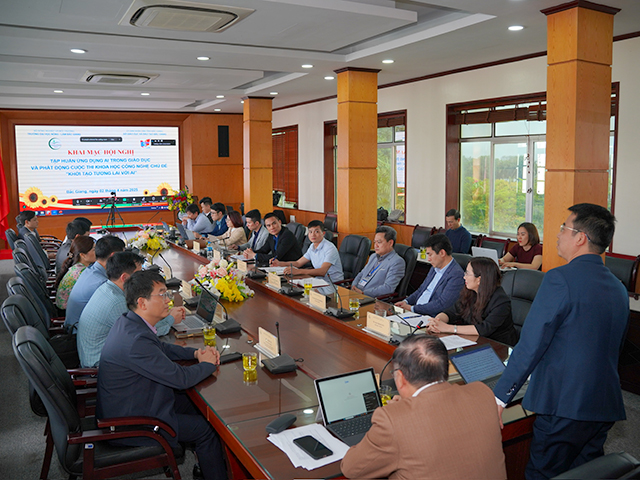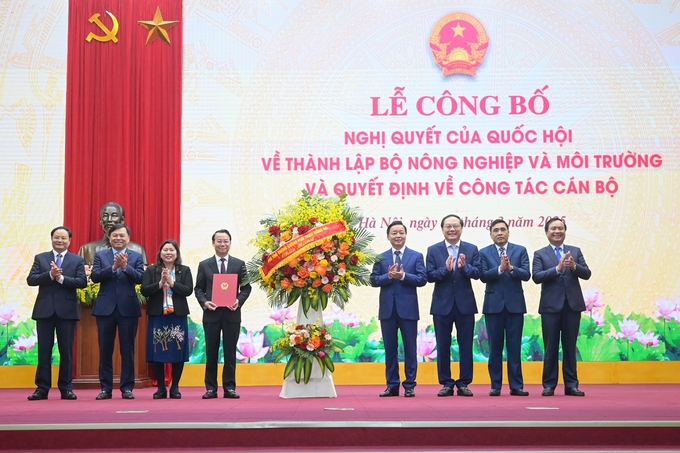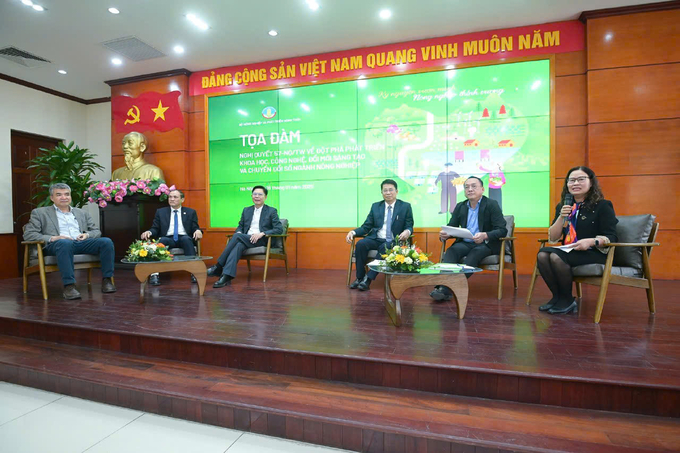Human resource training and development has been identified by the Party and State as one of the three strategic breakthroughs during national industrialisation and modernisation.
Agriculture is identified as an advantage, a sustainable foundation of Việt Nam while rural areas are important for economic development, therefore, training human resources for agriculture and rural areas is one of the most important tasks of the agriculture and rural development sector.
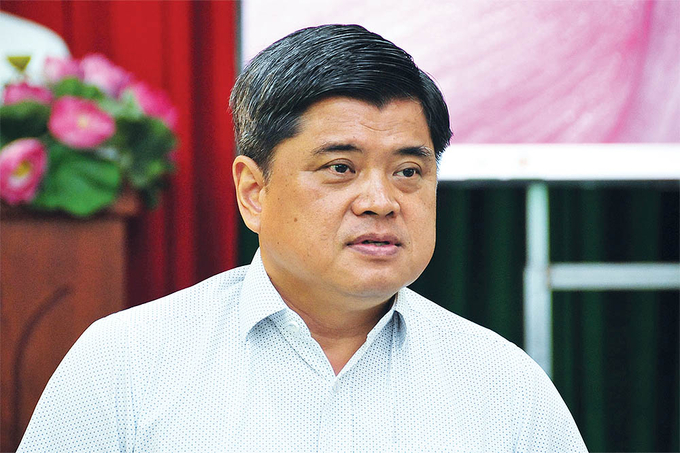
Deputy Minister of Agriculture and Rural Development Tran Thanh Nam. Photo: TD.
Over the years, the system of training institutions under the Ministry of Agriculture and Rural Development has continued to be consolidated as its quality has been innovating and improving. More attention is paid to enrollment and training as the institutions train more than 76,000 students yearly.
Training for civil servants and officials in the agricultural sector also got much care. The MARD has assigned tasks to training/research institutions to provide training courses for public employees according to professional titles and job positions.
In the two years 2020 and 2021, the ministry organised training courses for more than 29,000 turns of civil servants and public employees to improve their capacity to perform tasks and perfect the standards of ranks and professional titles according to the criteria of the Ministry of Finance.
Staff and lecturers are also further trained to improve their qualifications and experience. Scientific research is linked with professional training; step by step forming a team of leading experts in the agricultural industry.
Institutes and universities under the Ministry have been promoting Research and Development activities and technological transfer. Universities have actively assigned lecturers and researchers to participate in research and the transfer of advanced technologies. For example, the University of Water Resources established five scientific research institutes, and invested in developing specialised fields of science and technology in forecasting, design, and application of new materials technology.
Many tasks, topics, and projects of universities participating in scientific research programmes at ministerial and State levels. Some institutes have actively sent teachers and managers overseas for training courses with international standards. The institution also actively deployed advanced training models based on transferring international quality programmes.
By the end of 2021, institutions under the ministry have 38 doctoral-level training departments, 39 master’s-level training departments, and 96 university-level training departments. Of them, many advanced programmes were taught in English.
Vocational training enrollment has also had many innovative steps to improve quality. In the face of increasingly fierce competition in vocational training, schools have made great efforts and applied many creative and flexible solutions to attract students.
Many schools have actively approached the reality and worked with localities and businesses to understand the needs of agricultural labourers, and signed training cooperation agreements.
It is estimated that between 2020 and 2022, although there are still many difficulties in enrollment, vocational colleges under the ministry have enrolled more than 163,000 students, an increase of 1.05 per cent compared to the planned target.
Faced with the requirements of renovation and improvement of the quality of human resource training in the spirit of Resolution 13 of the Party, Resolution 19 of the 5th Plenum of the Party Central Committee on agriculture, farmers and rural areas, it was determined it was necessary to create breakthroughs in research and application of science and technology, innovation, digital transformation, and human resource training in agriculture and rural areas, Nam said.
He informed that by 2030, Việt Nam want to have 70 per cent of the agricultural workforce undergo training. Each year, about 1.5 million rural workers receive job training.
This is the task and responsibility of all levels and sectors from the central to local levels and especially for the agriculture and rural development sector, where human resource training and development faces many opportunities and challenges, Nam said.
“In addition, the trend of international economic integration is creating many opportunities and challenges for agricultural,” Nam said, a dding that international co-operation would help local institutes to step by step have equal access to scientific research and training with other countries in the region as well as developed countries in the world.
“Currently, Vietnam’s agriculture is moving towards leading agriculture in the world with better access to modern smart technologies to increase productivity and quality, and reduce production costs. Agriculture production associated with green growth and sustainable development are among the key tasks of the agricultural sector,” he said.
Research and training not only contribute to the application or transfer of smart technologies but also pave the way for the forms of new industries, circular economy, and digital economy in agriculture, especially the strong development of agricultural by-products process as a renewable resource.
“Agriculture 4.0 will lead to the formation of the main renewable energy production industry, which is biomass energy. Thus, the industrial revolution 4.0 and the application of digital technology in agricultural production are posing new opportunities and challenges,” he said.
The process of industrialisation, modernisation, and urbanisation is stepping up strongly in localities across the country. They require high-quality agricultural human resources to boost labour productivity, and green growth, creating quality, efficient and sustainable agricultural products.
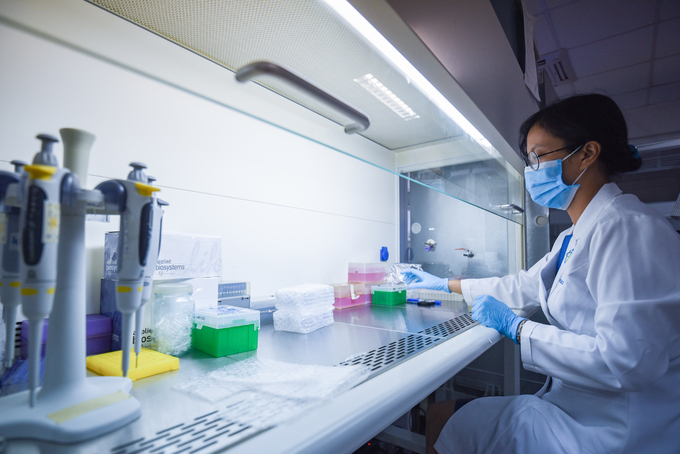
Some research institutes and schools have met regional and world standards. Photo: TD.
To take advantage of these opportunities and overcome the above challenges, research and training institutions and management agencies in the agricultural sector need to actively promote research activities and the transfer of new advanced technologies and digital transformation in agriculture. This is considered a strategic breakthrough and a regular task of the industry, Nam said.
Nam said that it was necessary to strengthen the management capacity of training institutions and State management agencies.
Mechanisms and policies are also needed to attract investors to science and technology in agriculture.
We also need to renovate and improve the quality of vocational training for farmers and rural workers to help them better meet the requirements of the industrial revolution 4.0 and implement digital transformation and digital economy in agricultural production and trade.
The training must meet the needs of enterprises and the market as well as promote the restructuring of agricultural labor associated with job creation.
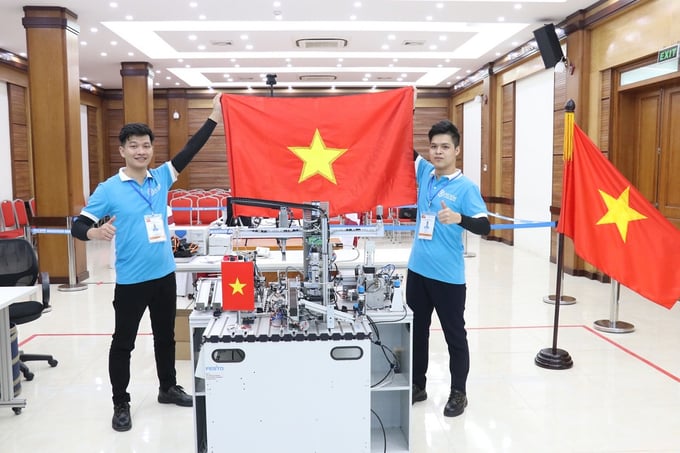
Hanoi College of Electromechanics actively signs contracts with foreign enterprises to send students to practice and commits to training human resources for enterprises. Photo: HCEM.
Skills that support research, training, and management such as legal knowledge, negotiation, market opening, trade promotion, investment promotion, ecological environment management, organic agriculture management, circular agriculture, smart agriculture, and digital agriculture also need to be improved to meet the new requirements of the agriculture and rural development industry.
To carry out the above-mentioned strategic tasks, the leaders, managers, scientific researchers, and teaching staff must master the Resolutions and policies of the Party. and the State, especially Resolution No. 19 on agriculture, farmers, and rural areas and the Strategy for the Development of the Agriculture and Rural Sector up to 2030, with a vision to 2050, Nam said.
The deputy minister called for advice and consultations so that the Ministry of Agriculture and Rural Development could timely issue effective policies to support human resource training and development.
Translated by Hien Anh




